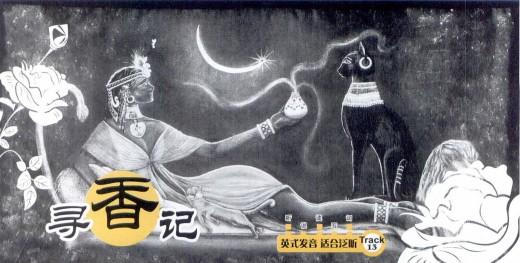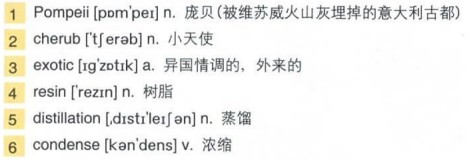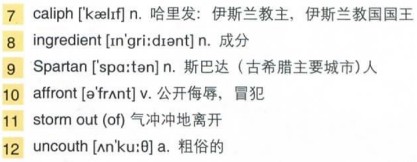
The invention of perfume occurred long before man began to record such things.
This painting from 1)Pompeii, of little 2)cherubs manufacturing highly prized and 3)exotic fragrances, shows that the Romans were using techniques that had not changed for thousands of years. Plants, flowers, 4)resins and other materials were crushed, strained and soaked into water, fats or oil. It was all very labour intensive and could take up to six months to produce one fragrance.
But then, in 870 AD, the world of perfume manufacture was revolutionised by an Arab invention—5)distillation. The steam 6)condenses into droplets that flow down a tube and are collected at the base, leaving pure rose oil floating on the surface of distilled water. It took 10,000 pounds of roses to produce just one pound of rose oil, and yet the Arab factories produced so much of it they were able to send an annual tribute of 30,000 bottles to the 7)Caliph of Baghdad. Rose oil is still used today as an 8)ingredient in over 75% of all perfumes.
But not everybody shared the Egyptian’s love of perfume. The 9)Spartans, for instance, banned it, and in 361 BC, when the Egyptians threw a banquet for the King of Sparta, Agesilaus, he was so 10)affronted by the smells of his hosts that he 11)stormed out. The Egyptians were equally offended by his 12)uncouth behaviour. It is possibly the only diplomatic incident in history to be caused by perfume.
早在人类还没有其相关记录以前,香水就诞生了。
在这幅庞贝古城的壁画中,小天使们正在制造珍贵、别具情调的香气,由此可以看出罗马的香水制作工艺几千年来始终如一。把植物、花朵、树脂和其他材料研碎、挤压,然后置于水、油脂中浸泡。这些工序通通都需要密集的劳力,且要耗费近六个月的时间才能生产出一种香味。
但在公元870年,香水制作被一项阿拉伯发明——蒸馏给颠覆了。蒸气凝固成小水滴,通过一管子往下流,汇入底盘中;便可获得浮在蒸馏水表面的纯玫瑰油。每一万磅玫瑰才生产出一磅玫瑰油。但阿拉伯的制作工厂产量惊人,每年可进贡三万瓶给巴格达国王。直到如今,市面上75%的香水成分仍含有玫瑰油。
但是并非所有人都如埃及人般热爱香水。例如斯巴达就下令禁止抹香水。在公元前361年,埃及为斯巴达国王阿格伊利俄斯举行一场宴会,国王觉得东道主的阵阵浓香是一种公然冒犯,于是扬长而去。埃及人同样对其无礼之举而感到不快。这也许是历史上惟一一宗由香水引发的外交事件。
翻译:慕席 

Sparta斯巴达
为何古埃及人会给斯巴达国王举办宴会?我们来回顾一下斯巴达的那段辉煌历史就明白个中缘由了……
History
Sparta was a city-state[城邦] in ancient Greece.
From 650 BC it rose to become the dominant military power in the region and as such was recognised as the overall leader of the combined Greek forces during the Persian Wars[波斯战争l. Between 431 and 404 BC Sparta was the principal enemy of Athens[雅典] during the Peloponnesian War[伯罗奔尼战争]. By 362 BC Sparta's role as the dominant military power in Greece was over.
Sparta and Athens
The two rivals of ancient Greece that made the most noise and gave us the most traditions were Athens and Sparta. They were close together on a map, yet far apart in what they valued and how they lived their lives.
Sparta, was recognized for its military strength. Spartan life was simple and focused on obedience and war.
Athens, on the other hand, was renowned as a centre of wisdom and learning. The people ofAthens were interested in arts, music, and intellectual pursuits.
